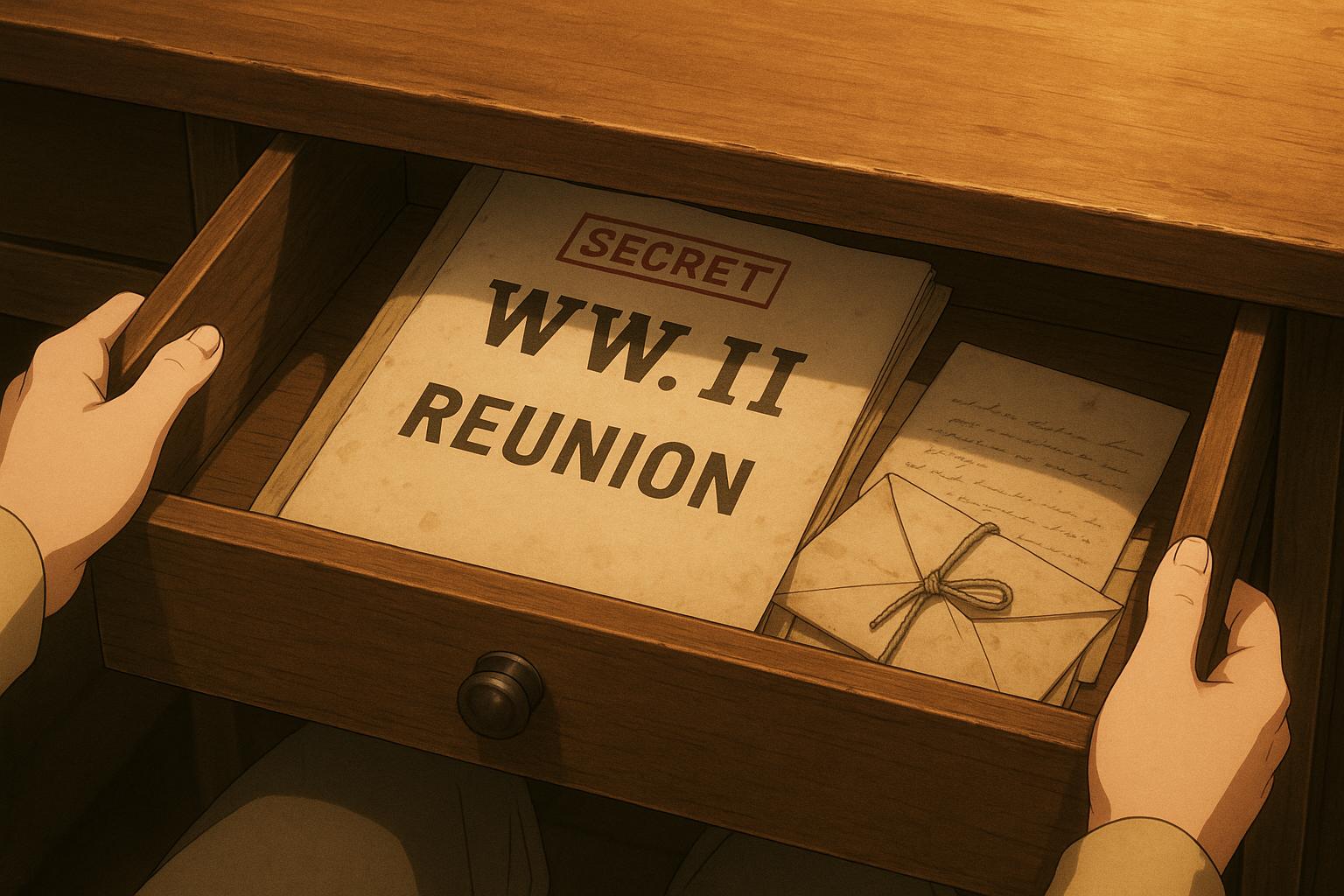A Scotland man’s purchase of an old desk uncovers hidden Second World War documents belonging to Ian Rodger, leading to an emotional reunion with his veteran son and shedding light on personal wartime experiences.
Martin Reid’s accidental discovery of a collection of Second World War documents has turned into a poignant reunion for the son of the late Ian Rodger, a veteran of the conflict. Reid, a resident of Lanark, Scotland, purchased a seemingly ordinary desk at auction four years ago for £110. It wasn’t until recently, during a furniture rearrangement, that he uncovered a hidden folder lodged behind a stuck drawer. This unexpected revelation has deepened the historical narrative surrounding the ties to the war and underscored the personal legacy of those who served.
The documents contained within the desk belonged to Ian Rodger, a former captain who served with the 2 Squadron of the 6th Armoured Division Signal Regiment in Italy and Tunisia. His contributions were part of the larger military effort known as the Liberation of Italy, which unfolded between 1943 and 1945. This pivotal campaign not only shaped the trajectory of the war but also laid the groundwork for the post-war reorganisation of Europe. In the folder were photographs, letters, and operational maps revealing insights into the British Army’s strategic movements and challenges during this crucial time.
Following the discovery, Reid’s efforts to track down the rightful owner of the documents led him to Ian Rodger’s son, Sandy, who resides in Rye, East Sussex. Sandy, who had been in Glasgow to assist his mother, Isabel, during a difficult time, was deeply moved upon learning that his father’s wartime legacy had not disappeared entirely. He expressed his gratitude to Reid for his initiative and the Church of Scotland, which helped facilitate the reunion. “I am hugely grateful to Martin and to Cameron Brooks from the church for their detective work,” Sandy remarked, reflecting on the significance of the recovered papers.
The stories denoted in these documents encapsulate not only military strategies but also personal narratives of resilience amid conflict. Reid noted how the perspective of a signals officer, like Ian Rodger, provided a unique overview of the war, one that often goes untold in broader historical accounts. The maps and letters offer a glimpse into the daily realities faced by soldiers far from home, striving to maintain communication and order during tumultuous times.
After the war, Ian Rodger returned to civilian life, practicing as a solicitor in Glasgow, co-founding Scottish Opera, and playing a substantial role in his community as a member of the Scouts and an elder at the Wellington Church of Scotland. His involvement in various social and cultural initiatives speaks to a post-war commitment to rebuilding society, reflecting the ethos of many veterans eager to contribute to their communities after intensive service.
The touching reunion of Sandy and the documents serves as a reminder of the generational bonds shaped by history and the importance of preserving personal and collective memories of those who served. As Sandy leafed through the folder, sharing anecdotes and reflecting on his father’s life, Reid found joy in facilitating a meaningful connection to the past, noting how stories like this resonate with many families who seek to understand their heritage in the context of wider historical events.
In an age where personal memorabilia often fades into obscurity, the discovery of Ian Rodger’s papers highlights the enduring nature of family ties and the significance of remembering those who lived through some of history’s greatest trials. Options for preservation and sharing such legacies are essential, ensuring that the experiences of veterans like Rodger continue to educate and inspire future generations.
Reference Map:
- Paragraph 1 – [1], [2]
- Paragraph 2 – [1], [4]
- Paragraph 3 – [1], [5]
- Paragraph 4 – [3], [6]
- Paragraph 5 – [1], [2]
- Paragraph 6 – [1], [7]
Source: Noah Wire Services
- https://www.dailyrecord.co.uk/news/scottish-news/son-reunited-hero-dads-ww2-35312516 – Please view link – unable to able to access data
- https://www.independent.co.uk/news/uk/home-news/glasgow-british-italy-british-army-church-of-scotland-b2746843.html – Martin Reid, from Lanark, Scotland, purchased a desk at auction four years ago. While moving furniture, he discovered a folder containing photographs, letters, and maps related to the British Army’s involvement in the Liberation of Italy between 1943 and 1945. The documents belonged to Ian Rodger, a Glasgow native who served with 2 Squadron of the 6th Armoured Division Signal Regiment in Italy and Tunisia. After demobilisation, Rodger practised as a solicitor, co-founded Scottish Opera, and was involved in the Scouts and Wellington Church of Scotland in Glasgow. He passed away in 2007 at the age of 91. The Church of Scotland is now seeking to reunite the documents with Rodger’s son, Sandy, who is believed to reside on the south coast of England. ([independent.co.uk](https://www.independent.co.uk/news/uk/home-news/glasgow-british-italy-british-army-church-of-scotland-b2746843.html?utm_source=openai))
- https://www.churchofscotland.org.uk/news-and-events/news/articles/elders-wartime-records-discovered-hidden-in-desk-bought-at-auction-18-years-after-his-death – A folder of Second World War documents belonging to Church of Scotland elder Ian Rodger was found hidden in a desk bought at auction 18 years after his death. The desk, purchased by Martin Reid from Lanark in March 2021, contained photographs, letters, and maps related to the British Army’s involvement in the Liberation of Italy between 1943 and 1945. The Church of Scotland is now seeking to reunite the documents with Rodger’s son, Sandy, who is believed to reside on the south coast of England. ([churchofscotland.org.uk](https://www.churchofscotland.org.uk/news-and-events/news/articles/elders-wartime-records-discovered-hidden-in-desk-bought-at-auction-18-years-after-his-death?utm_source=openai))
- https://www.expressandstar.com/uk-news/2025/05/07/second-world-war-papers-found-hidden-in-desk-bought-at-auction/ – Martin Reid, from Lanark, Scotland, purchased a desk at auction four years ago. While moving furniture, he discovered a folder containing photographs, letters, and maps related to the British Army’s involvement in the Liberation of Italy between 1943 and 1945. The documents belonged to Ian Rodger, a Glasgow native who served with 2 Squadron of the 6th Armoured Division Signal Regiment in Italy and Tunisia. After demobilisation, Rodger practised as a solicitor, co-founded Scottish Opera, and was involved in the Scouts and Wellington Church of Scotland in Glasgow. He passed away in 2007 at the age of 91. The Church of Scotland is now seeking to reunite the documents with Rodger’s son, Sandy, who is believed to reside on the south coast of England. ([expressandstar.com](https://www.expressandstar.com/uk-news/2025/05/07/second-world-war-papers-found-hidden-in-desk-bought-at-auction/?utm_source=openai))
- https://www.ireland-live.ie/news/uk/1796352/second-world-war-papers-found-hidden-in-desk-bought-at-auction.html – Martin Reid, from Lanark, Scotland, purchased a desk at auction four years ago. While moving furniture, he discovered a folder containing photographs, letters, and maps related to the British Army’s involvement in the Liberation of Italy between 1943 and 1945. The documents belonged to Ian Rodger, a Glasgow native who served with 2 Squadron of the 6th Armoured Division Signal Regiment in Italy and Tunisia. After demobilisation, Rodger practised as a solicitor, co-founded Scottish Opera, and was involved in the Scouts and Wellington Church of Scotland in Glasgow. He passed away in 2007 at the age of 91. The Church of Scotland is now seeking to reunite the documents with Rodger’s son, Sandy, who is believed to reside on the south coast of England. ([ireland-live.ie](https://www.ireland-live.ie/news/uk/1796352/second-world-war-papers-found-hidden-in-desk-bought-at-auction.html?utm_source=openai))
- https://www.kentonline.co.uk/news/national/second-world-war-papers-found-hidden-in-desk-bought-at-auction-145855/ – Martin Reid, from Lanark, Scotland, purchased a desk at auction four years ago. While moving furniture, he discovered a folder containing photographs, letters, and maps related to the British Army’s involvement in the Liberation of Italy between 1943 and 1945. The documents belonged to Ian Rodger, a Glasgow native who served with 2 Squadron of the 6th Armoured Division Signal Regiment in Italy and Tunisia. After demobilisation, Rodger practised as a solicitor, co-founded Scottish Opera, and was involved in the Scouts and Wellington Church of Scotland in Glasgow. He passed away in 2007 at the age of 91. The Church of Scotland is now seeking to reunite the documents with Rodger’s son, Sandy, who is believed to reside on the south coast of England. ([kentonline.co.uk](https://www.kentonline.co.uk/news/national/second-world-war-papers-found-hidden-in-desk-bought-at-auction-145855/?utm_source=openai))
- https://www.upday.com/uk/secret-world-war-ii-papers-found-hidden-in-desk-bought-at-auction – Martin Reid, from Lanark, Scotland, purchased a desk at auction four years ago. While moving furniture, he discovered a folder containing photographs, letters, and maps related to the British Army’s involvement in the Liberation of Italy between 1943 and 1945. The documents belonged to Ian Rodger, a Glasgow native who served with 2 Squadron of the 6th Armoured Division Signal Regiment in Italy and Tunisia. After demobilisation, Rodger practised as a solicitor, co-founded Scottish Opera, and was involved in the Scouts and Wellington Church of Scotland in Glasgow. He passed away in 2007 at the age of 91. The Church of Scotland is now seeking to reunite the documents with Rodger’s son, Sandy, who is believed to reside on the south coast of England. ([upday.com](https://www.upday.com/uk/secret-world-war-ii-papers-found-hidden-in-desk-bought-at-auction?utm_source=openai))













